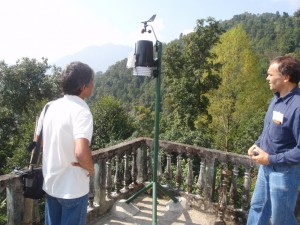A team from UNIL Risk Analysis Group recently conducted a field study trip in the Pokhara area of Western Nepal, where UNIL (in collaboration with IUCN) is establishing three bio-engineering sites along three road segments with erosion/shallow landslide problems. The purpose is to demonstrate low-cost bio-engineering measures combining simple civil engineering and vegetative solutions in collaboration with local communities. Each site now has an automated weather station and plant test plots are being established to test drought resistance. The team also visited and scanned a recent large landslide (6 million m3) named Mankha/Sun Koshi River landslide which killed 145 people.
Disaster Risk Reduction, Hazard Assesment, and Risk Analysis

